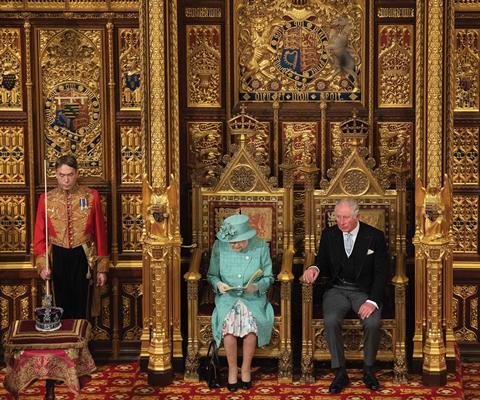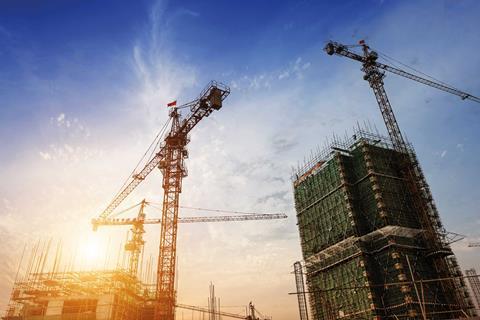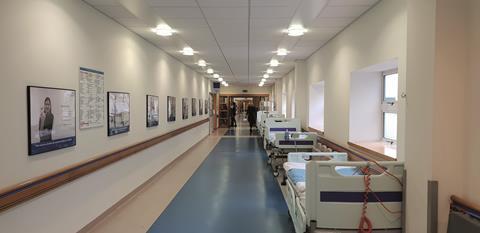Last month’s Queen’s speech should have cheered the construction sector, with billions of pounds earmarked for schools, housing, hospitals and more. Hamish Champ surveys the promises – and reports on industry reaction

From a construction angle, the government’s agenda, as spelled out in last month’s Queen’s speech, was not short on ambition and should – in theory – give considerable cause for optimism. Mirroring much of the Conservatives’ manifesto in the run-up to the general election, the speech earmarked hundreds of billions of pounds for transport schemes, tackling the housing crisis, building new schools and hospitals, beefing up building safety, skilling up the workforce and increasing the powers of regional authorities across the country to spend money on essential projects.
It could be years before many of the schemes being talked about will be in a position to be tendered for, let alone for construction work to commence
Jon Hart, Pinsent Masons
One stage of Brexit uncertainty is at an end, finally kicked into touch by the passing of Boris Johnson’s Brexit withdrawal bill and the exit date set at the end of this month. Combined with the prime minister’s sizeable parliamentary majority, this has bolstered business confidence. The government’s priorities are clear, but there is still a lot of detail missing, some of which will become clear in the Budget expected in February.
We know a little more about immigration policy. The government is going to push through a points-based immigration system that will assess the skills of a foreign individual seeking to live and work in the UK, rather than his or her country of origin. While this is popular with many voters, limiting the flow of people into the UK will remain a concern to many in the construction sector who are worried about where they will find much-needed workers in the trades. At the professional end of the sector, there is some relief at the news the government will abolish the limit on the number of fast-track visas it hands out to “exceptionally talented” professionals including architects.

The construction industry generally welcomed the proposals outlined in the Queen’s speech, although there were inevitable caveats. The points-based immigration system “had to be balanced”, according to Brian Berry, chief executive of the Federation of Master Builders, while Jon Hart, infrastructure law expert at Pinsent Masons, believed a combination of the public sector capacity gap within government for procuring schemes and the industry’s skills shortage meant “it could be years before many of the schemes being talked about will be in a position to be tendered for, let alone for construction work to commence. This will certainly take things well beyond the current electoral cycle”.
Elsewhere the overall thrust of the government’s commitments, especially around its plans to spend £100bn on roads, rail, and other infrastructure goodies, was given the thumbs up.
Others similarly welcomed proposals to tighten up building safety in the wake of the Grenfell fire, although Ian Fletcher, director of real estate policy at the British Property Federation, was not alone in saying that the government’s stated ambition would need to be backed with adequate resources if any new system was to be “workable”.
The government has spelt out what it plans to do: deliver more homes, schools and hospitals, create better transport facilities, improve construction standards and reform the planning system and transform business practices. The construction industry will now be looking for that ambition to be backed with firm commitment and decisive action.
Schools and hospitals
The government revealed plans to boost investment in schools by £14bn over the next three years, and “implement the biggest infrastructure revolution in living memory”. The core schools’ budget will be £7.1bn higher in 2022/23 than this year, and there will be £1.8bn rebuilding programme over five years to upgrade the further education college estate. It is also planning to establish 20 institutes of technology across England, offering higher technical education and training in science, technology, engineering and maths subjects, while a £10bn single housing infrastructure fund will support the delivery of roads, schools and GP surgeries needed to support new homes.

The government repeated its pledge to build 40 hospitals over the next 10 years, although there were no new details on how much this programme would cost. Alongside a multi-year funding settlement for the NHS enshrined in law – providing £33.9bn increase in cash terms by 202/24 – the government said building projects “will provide a range of new healthcare facilities to replace poor estate and provide a better patient environment, including emergency and specialist care, and women’s and children’s services”.
Brexit and immigration
The government can now put into place one of its key post-Brexit plans: a new immigration system. The Queen’s speech said the legislation will end freedom of movement and pave the way for a new points-based immigration scheme “based on people’s skills and contributions to the UK”.

Construction was not mentioned as one of the sectors with particular visa systems – which includes a fast-track NHS scheme. The new single system would, however, allocate points on a range of criteria across three broad – but unspecified –
















